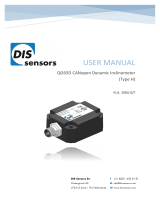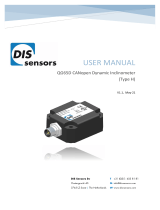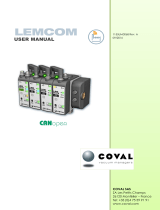Page is loading ...

Abmessungen
Elektrischer Anschluss/Kurven/
Zusätzliche Informationen
Electrical Connection / Curves / Additional Information
Dimensions
Technische Daten Technical data
INY360D-F99-B16-V15
104510
64
65
4 x ø 5.5
M12
730 718.5
37
LEDs
104510
64
65
4 x ø 5.5
M12
730 718.5
37
LEDs
1n.c.
2
3
+UB
GND
CAN-L
4
5
CAN-H
1
3
4
5
2
1n.c.
2
3
+UB
GND
CAN-L
4
5
CAN-H
1
3
4
5
2
Partnummer / Part. No.:
Datum / Date:
212421
03/25/2015 DIN A3 -> DIN
45-2882E
Doc. No.:
1 BN
2 WH
3 BU
4 BK
5 GY
Wire colors in accordance with EN 60947-5-2
(brown)
(white)
(blue)
(black)
(gray)
1 BN
2 WH
3 BU
4 BK
5 GY
Adernfarben gemäß EN 60947-5-2
(braun)
(weiß)
(blau)
(schwarz)
(grau)
Einbaulage
Im Auslieferungszustand ist die Null-Lage der Sensorachsen erreicht, wenn der elektrische Anschluss des Sensors senkrecht nach oben weist.
X-Orientierung
Y-Orientierung
Allgemeine Daten
Typ Neigungssensor, 2-achsig
Messbereich 0 ... 360 °
Absolute Genauigkeit ≤ ± 0,5 °
Ansprechverzug ≤ 25 ms
Auflösung ≤ 0,1 °
Reproduzierbarkeit ≤ ± 0,1 °
Temperatureinfluss ≤ 0,027 °/K
Kenndaten funktionale Sicherheit
MTTFd 300 a
Gebrauchsdauer (TM) 20 a
Diagnosedeckungsgrad (DC) 0 %
Anzeigen/Bedienelemente
Betriebsanzeige LED, grün
Elektrische Daten
Betriebsspannung UB10 ... 30 V DC
Leerlaufstrom I0≤ 50 mA
Bereitschaftsverzug tv≤ 2,5 s
Schnittstelle
Schnittstellentyp CANopen
Geräteprofil CiA410, Ver. 1.2
Ausgabecode Binär-Code
Übertragungsrate 125 kBit/s , 250 kBit/s , 500 kBit/s , 1 MBit/s , parametrierbar
Node ID 1 ... 127 , parametrierbar
Abschluss extern
Zykluszeit ≥ 20 ms
Umgebungsbedingungen
Umgebungstemperatur -40 ... 85 °C (-40 ... 185 °F)
Lagertemperatur -40 ... 85 °C (-40 ... 185 °F)
Mechanische Daten
Anschlussart Gerätestecker M12 x 1, 5-polig
Gehäusematerial PA
Schutzart IP68 / IP69K
Masse 240 g
Werkseinstellungen
Node ID 1
Übertragungsrate 250 kBit/s
Normen- und Richtlinienkonformität
Normenkonformität
Schock- und Stoßfestigkeit 100 g gemäß DIN EN 60068-2-27
Normen EN 60947-5-2:2007
IEC 60947-5-2:2007
Zulassungen und Zertifikate
UL-Zulassung cULus Listed, Class 2 Power Source
CSA-Zulassung cCSAus Listed, General Purpose, Class 2 Power Source
E1-Typgenehmigung 10R-04
+
-
X = 0° X = 90° X = ±180° X = 270° (-90°)
Sensor Orientation
In the default setting the zero position of the sensor is reached, when the electrical connection faces straight upwards.
X Orientation
Y Orientation
General specifications
Type Inclination sensor, 2-axis
Measurement range 0 ... 360 °
Absolute accuracy ≤ ± 0.5 °
Response delay ≤ 25 ms
Resolution ≤ 0.1 °
Repeat accuracy ≤ ± 0.1 °
Temperature influence ≤ 0.027 °/K
Functional safety related parameters
MTTFd 300 a
Mission Time (TM) 20 a
Diagnostic Coverage (DC) 0 %
Indicators/operating means
Operation indicator LED, green
Electrical specifications
Operating voltage UB10 ... 30 V DC
No-load supply current I0≤ 50 mA
Time delay before availability tv≤ 2.5 s
Interface
Interface type CANopen
Device profile CiA410, Ver. 1.2
Data output code binary code
Transfer rate 125 kBit/s , 250 kBit/s , 500 kBit/s , 1 MBit/s , programmable
Node ID 1 ... 127 , programmable
Termination external
Cycle time ≥ 20 ms
Ambient conditions
Ambient temperature -40 ... 85 °C (-40 ... 185 °F)
Storage temperature -40 ... 85 °C (-40 ... 185 °F)
Mechanical specifications
Connection type 5-pin, M12 x 1 connector
Housing material PA
Degree of protection IP68 / IP69K
Mass 240 g
Factory settings
Node ID 1
Transfer rate 250 kBit/s
Compliance with standards and directives
Standard conformity
Shock and impact resistance 100 g according to DIN EN 60068-2-27
Standards EN 60947-5-2:2007
IEC 60947-5-2:2007
Approvals and certificates
UL approval cULus Listed, Class 2 Power Source
CSA approval cCSAus Listed, General Purpose, Class 2 Power Source
E1 Type approval 10R-04
+
-
X = 0° X = 90° X = ±180° X = 270° (-90°)
Neigungssensor
Inclination sensor
Alle Abmessungen in mm All dimensions im mm

Adressen / Addresses / Adresses / Direcciónes / Indirizzi
Contact Pepperl+Fuchs GmbH · 68301 Mannheim · Germany · Tel. +49 621 776-4411 · Fax +49 621 776-27-4411 · E-mail: fa-info@de.pepperl-fuchs.com
Worldwide Headquarters: Pepperl+Fuchs GmbH · Mannheim · Germany · E-mail: [email protected]l-fuchs.com
USA Headquarters: Pepperl+Fuchs Inc. · Twinsburg · USA · E-mail: fa-in[email protected].com
Asia Pacific Headquarters: Pepperl+Fuchs Pte Ltd · Singapore · E-mail: [email protected]perl-fuchs.com · Company Registration No. 199003130E
For more contact-adresses refer to the catalogue or internet: http://www.pepperl-fuchs.com
Montage des Sensors
Sensoren der Baureihe -F99 bestehen aus dem Sensormodul und dem dazugehörigen Gehäuse aus Aluminium-Druckguss. Wählen Sie zur Mon-
tage des Sensors eine senkrechte, ebene Fläche mit den Mindestabmessungen 70 mm x 50 mm.
Zur Sensormontage gehen Sie wie folgt vor:
1. Lösen Sie die Zentralschraube unterhalb des Sensoranschlusses.
2. Schieben Sie das Klemmelement so weit zurück, bis Sie das Sensormodul aus dem Gehäuse entnehmen können.
3. Nehmen Sie das Sensormodul aus dem Gehäuse.
4. Positionieren Sie das Gehäuse am gewünschten Montageort und befestigen Sie es mit vier Senkkopfschrauben. Achten Sie darauf, dass
die Schraubenköpfe nicht überstehen.
5. Setzen Sie das Sensormodul in das Gehäuse ein.
6. Schieben Sie das Klemmelement bündig in das Gehäuse. Kontrollieren Sie den ordnungsgemäßen Sitz des Sensorelements.
7. Ziehen Sie nun die Zentralschraube fest.
Der Sensor ist nun montiert.
Einstellung der Baudrate
Neigungssensoren von Pepperl+Fuchs werden mit der Baudrate 250 kbit/s ausgeliefert. Zum Ändern der Baudrate schreiben Sie die gewünschte
neue Baudrate in Objekt 2001h "Baudrate“. Nach dem Befehl "Reset Sensor“ per NMT-Nachricht oder einer Unterbrechung der Versorgungss-
pannung meldet sich der Sensor mit der neuen Baudrate. Der Neigungssensor unterstützt die Baudraten 125 kbit/s, 250 kbit/s, 500 kbit/s und 1
Mbit/s. Ungültige Werte werden nicht übernommen. In diesem Fall bleibt die aktuelle Einstellung erhalten.
Beispiel Baudrate von 250kBit/s auf 1MBit/s ändern:
CAN-ID: 601h, SDO1 Kanal des Knoten 1
Befehl: 2Fh, Objekt schreiben, 1 Byte Nutzdaten
Objektindex: 2001h, Achtung: zuerst Lowbyte, dann Highbyte!
Subindex: 00h
neue Baudrate: 08h, für 1 Mbit/s
neue Baudrate: 04h, für 500 kbit/s
neue Baudrate: 02h, für 250 kbit/s
neue Baudrate: 01h, für 125 kbit/s
LED-Anzeigen
Der Neigungssensor ist zur schnellen optischen Kontrolle mit 3 Anzeige-LEDs ausgestattet.
- Die grüne power-LED dient der Anzeige des Versorgungszustandes
- Die gelbe run-LED dient der Anzeige des Bus- und Sensorstatus
- Die rote err-LED dient der Fehleranzeige
Störfestigkeit nach DIN ISO 11452-2: 100 V/m
Frequenzband 20 MHz bis 2 GHz
Leitungsgeführte Störgrößen nach ISO 7637-2:
601h 2Fh 01h 20h 00h 08h xxh xxh xxh
CAN-ID Befehl Objektindex Subindex neue
Baudrate
ungenutzt
Datenbyte
1
Datenbyte
2
Datenbyte
3
Datenbyte
4
Datenbyte
5
Datenbyte
6
Datenbyte
7
Datenbyte
8
power (grün) run (gelb) err (rot) Bedeutung
aus aus aus keine Spannungsversorgung
ein konstant blinkend aus Pre-Operational
ein 1x blinkend aus Stopped
ein ein aus Operational
ein aus ein CAN-Bus aus
ein gemäß Busstatus 1x blinkend Warnung, z. B. außerhalb des Mess-
bereichs
ein gemäß Busstatus 2x blinkend Fehler, z. B. EEPROM Checksumme
fehlerhaft
konstant blinkend aus ein Unterspannung
EMV-Eigenschaften
Impuls 1 2a2b3a3b4
Schärfegrad III III III III III III
Ausfallkriterium C A C A A C
EN 61000-4-2: CD: 8 kV / AD: 15 kV
Schärfegrad IV IV
EN 61000-4-3: 30 V/m (80...2500 MHz)
Schärfegrad IV
EN 61000-4-4: 2 kV
Schärfegrad III
EN 61000-4-6: 10 V (0,01...80 MHz)
Schärfegrad III
EN 55011: Klasse A
Y = 0° Y = 90° Y = ±180° Y = 270° (-90°)
+
-
5.
7.
6.
3 Nm
4.
1.
2.
3.
Mounting of the sensor
Sensors from the -F99 series consist of a sensor module and accompanying cast aluminum housing. Select a vertical surface with minimum dimen-
sions of 70 mm x 50 mm to mount the sensor.
Mount the sensor as follows:
1. Loosen the central screw under the sensor connection.
2. Slide back the clamping element until you are able to remove the sensor module from the housing.
3. Remove the sensor module from the housing
4. Position the housing at the required mounting location and secure using four countersunk screws. Make sure that the heads of the screws do
not protrude.
5. Place the sensor module in the housing.
6. Slide the clamping element flush into the housing. Check that the sensor element is seated correctly.
7. Finally tighten the central screw.
The sensor is now mounted correctly.
Baud rate setting
Inclination sensors by Pepperl+Fuchs are supplied with a baud rate of 250 kbit/s. To change the baud rate, write the new baud rate to object 2001h
“Baud rate.” If a “Reset sensor” command is issued via an NMT message or the power supply is interrupted, the sensor operates at the new baud rate.
The inclination sensor supports the baud rates 125 kbit/s, 250 kbit/s, 500 kbit/s and 1 Mbit/s. Invalid values are not adopted. In this case, the current
setting is retained.
Example of modifying the baud rate from 250 kbit/s to 1 Mbit/s:
CAN ID: 601h, SDO1 channel of node 1
Command: 2Fh, write object, 1 byte of usable data
Object index: 2001h, note: low byte first, then high byte!
Subindex: 00h
New baud rate: 08h, for 1 Mbit/s
New baud rate: 04h, for 500 kbit/s
New baud rate: 02h, for 250 kbit/s
New baud rate: 01h, for 125 kbit/s
LED displays
The inclination sensor has three indicator LEDs that allow rapid visual monitoring.
- The green power LED indicates the state of the power supply
- The yellow run LED indicates the bus and sensor status
-The red err LED indicates an error
EMC Properties
Interference immunity in accordance with
DIN ISO 11452-2: 100 V/m
Frequency band 20 MHz up to 2 GHz
Mains-borne interference in accordance with ISO 7637-2:
601h 2Fh 01h 20h 00h 08h xxh xxh xxh
CAN-ID Com-
mand
Object index Subindex New
baud rate
not used
Data byte
1
Data byte
2
Data byte
3
Data byte
4
Data byte
5
Data byte 6 Data byte
7
Data
byte 8
power (green) run (yellow) err (red) Meaning
Off Off Off No power supply
On Flashing constantly Off Pre-operational
On 1x flashing Off Stopped
On On Off Operational
On Off On CAN bus off
On depending on bus status 1x flashing Warning, e.g., outside
measuring range
On depending on bus status 2x flashing Error, e.g., EEPROM
checksum incorrect
Flashing constantly Off On Undervoltage
Pulse 1 2a 2b 3a 3b 4
Severity level III III III III III III
Failure criterion C A C A A C
EN 61000-4-2: CD: 8 kV / AD: 15 kV
Severity level IV IV
EN 61000-4-3: 30 V/m (80...2500 MHz)
Severity level IV
EN 61000-4-4: 2 kV
Severity level III
EN 61000-4-6: 10 V (0.01...80 MHz)
Severity level III
EN 55011: Klasse A
Y = 0° Y = 90° Y = ±180° Y = 270° (-90°)
+
-
5.
7.
6.
3 Nm
4.
1.
2.
3.
/


